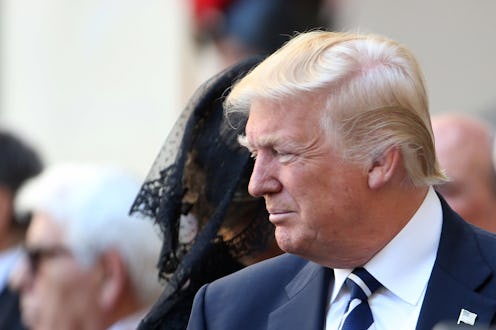News
Courts Slam Down Trump's Travel Ban. Again.

On Thursday, a federal appeals court refused to reinstate the Trump administration's travel ban, setting the stage for a Supreme Court showdown. The U.S. Fourth Circuit Court of Appeals in Richmond, Virginia, ruled that although the Trump administration had moderated aspects from the original executive order travel ban, the second attempt still did not pass muster. Specifically, the court found that the second travel ban still unlawfully targeted Muslim people.
The court ruled in a 10-3 decision to uphold a federal judge in Maryland's ruling against the executive order in March.
Chief Judge Roger Gregory wrote in the majority opinion:
We find that the reasonable observer would likely conclude that [the executive order's] primary purpose is to exclude persons from the United States on the basis of their religious beliefs.
He added that the order "drips with religious intolerance, animus, and discrminiation."
Under the executive order, travelers from six Muslim-majority countries — Iran, Libya, Somalia, Sudan, Syria, and Yemen — would be temporarily banned from entering the United States.
Gregory also noted in the majority opinion that there was a limit to the president's power to restrict people from entering the United States.
Congress granted the president broad power to deny entry to aliens, but that power is not absolute. ... It cannot go unchecked when, as here, the president wields it through an executive edict that stands to cause irreparable harm to individuals across this nation.
Unlike the initial travel band issued in January, there were no specific references to religion in the revised one. However, that removal does not appear to have assuaged concerns about the constitutionality of the order.
There were other notable differences between the first and second executive order travel bans. Iraq was include in the first as one of the countries whose residents would be temporarily barred from entering the United States. There was also an indefinite ban on Syrian immigrants entering the United States.
Many legal experts think the Fourth Circuit's ruling sets the stage for the Supreme Court to weigh in on the executive order. University of Texas at Austin law professor Steve Vladeck tweeted that even before a case makes it way to the Supreme Court, Trump could ask for a stay on the Thursday ruling — though he also noted "it takes five votes to grant, and requires gov't to show irreparable harm from leaving the #TravelBan on hold. Given how much time has already passed, seems unlikely."
When and whether the executive order makes it way to the Supreme Court remains to be seen.